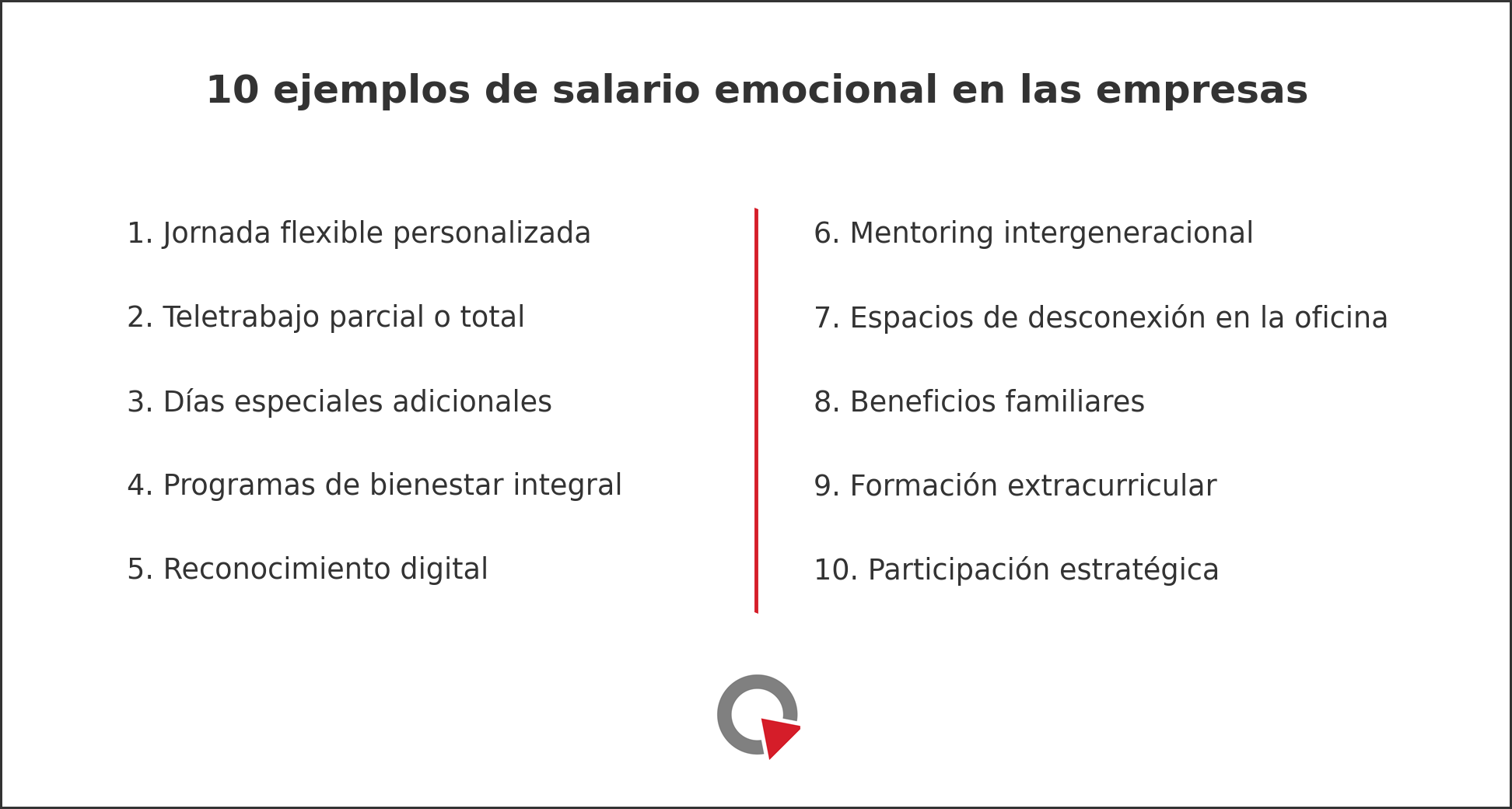Salario emocional ventajas y desventajas en las empresas.
¿Qué es el salario emocional y por qué está en auge?
Tras una época marcada por la retracción económica y por un cambio profundo en las motivaciones de los trabajadores, las empresas se han visto obligadas a aplicar la creatividad en aspectos que, a primera vista, parecen poco creativos, como la retribución a los empleados.
Cuando las compañías no pueden ofrecer un incremento salarial directo, surge una alternativa que gana cada vez más importancia: el salario emocional. Este concepto hace referencia a todos aquellos beneficios, tangibles o intangibles, que la empresa ofrece a sus empleados para mejorar su bienestar y satisfacción, sin que ello suponga un aumento de sueldo directo. El objetivo es claro: mejorar la calidad de vida del trabajador y, en consecuencia, reforzar su compromiso con la organización.
Ejemplos reales de salario emocional
Un caso reconocido en España es el de Iberdrola, primera empresa del IBEX-35 en implantar una jornada intensiva. Esta medida no solo favoreció la conciliación laboral y personal de sus empleados, sino que también generó efectos positivos en la empresa: aumento de la productividad, reducción del absentismo y disminución de la siniestralidad laboral.
Este ejemplo muestra cómo los incentivos no monetarios pueden convertirse en palancas estratégicas de crecimiento y bienestar. No se trata únicamente de dar “beneficios extra”, sino de generar un entorno laboral atractivo donde el empleado se sienta valorado, motivado y alineado con los objetivos corporativos.
La retribución flexible como base del salario emocional
El salario emocional se apoya en la Retribución Flexible, un modelo que permite al trabajador maximizar su nómina a través de un paquete de servicios exentos de IRPF, como:
- Abonos de transporte.
- Guardería para hijos.
- Comidas diarias en restaurantes o tickets restaurante.
De esta forma, el trabajador mejora su poder adquisitivo sin que la empresa asuma un gasto adicional. Este equilibrio convierte al salario emocional en una estrategia eficaz tanto para la compañía como para el empleado.
Características del salario emocional en las organizaciones
Horarios flexibles
El presentismo ya no es sinónimo de productividad. Favorecer horarios flexibles que permitan conciliar vida personal y laboral es la primera seña de identidad del salario emocional.
Participación de los trabajadores
Involucrar a los empleados en la toma de decisiones refuerza su sentido de pertenencia y aumenta el compromiso con la empresa.
Reconocimiento profesional
El reconocimiento constante y justo potencia la motivación. No se trata solo de recompensas económicas, sino de valorar públicamente los logros individuales y colectivos.
Formación y desarrollo de carrera
Ofrecer oportunidades de formación continua, programas de coaching y planes de carrera asegura el crecimiento profesional de los empleados y mejora su fidelización.
10 ejemplos prácticos de salario emocional
Más allá de la teoría, muchas empresas están llevando el salario emocional a la práctica con iniciativas concretas que los empleados valoran positivamente. Aquí tienes 10 ejemplos reales que pueden servir de inspiración:
- Jornada flexible personalizada: no solo entrada y salida flexible, sino adaptación puntual del horario en función de la vida familiar o académica.
- Teletrabajo parcial o total: incorporación de días de home office, o incluso puestos 100% remotos para determinados perfiles.
- Días especiales adicionales: jornada libre en el cumpleaños del trabajador o en fechas clave para la familia.
- Programas de bienestar integral: yoga, mindfulness, nutrición, fisioterapia o convenios con gimnasios.
- Reconocimiento digital: plataformas internas donde compañeros y jefes pueden felicitar logros y otorgar puntos canjeables por recompensas.
- Mentoring intergeneracional: unir perfiles sénior con juniors para fomentar transferencia de conocimiento y acelerar el desarrollo profesional.
- Espacios de desconexión en la oficina: áreas de descanso, zonas verdes, cafeterías internas o rincones creativos.
- Beneficios familiares: ayudas a guardería, becas escolares o programas de apoyo para el cuidado de dependientes.
- Formación extracurricular: cursos no vinculados directamente al puesto (idiomas, soft skills, liderazgo).
- Participación estratégica: creación de comités internos donde los empleados puedan aportar ideas para innovación y sostenibilidad.
Salario emocional y retención del talento
Uno de los grandes retos actuales es la retención de talento. El salario emocional se convierte en una herramienta clave para evitar que los empleados más valiosos abandonen la compañía en busca de mejores condiciones.
Los beneficios emocionales generan vínculos duraderos entre empresa y trabajador, reforzando la lealtad y reduciendo la rotación. Esto no solo ahorra costes de contratación, sino que mantiene la estabilidad y el know-how dentro de la organización.
Diferencias generacionales en la percepción del salario emocional
Generación nacida antes de 1970
Para este grupo, el valor está en la seguridad y el reconocimiento: planes de jubilación, seguros médicos y programas de agradecimiento a la experiencia acumulada.
Generación 70–80
Su prioridad es el equilibrio vida-trabajo. Prefieren jornadas flexibles, teletrabajo parcial, días libres adicionales y desarrollo profesional mediante formación especializada.
Generaciones más jóvenes (millennials y centennials)
Aunque no estaba en tu texto, conviene añadir que los profesionales más jóvenes valoran especialmente:
- La posibilidad de teletrabajar o trabajar en modalidad híbrida.
- Espacios laborales creativos y colaborativos.
- Planes de bienestar físico y mental.
- Oportunidades de crecimiento rápido y feedback continuo.
Ventajas del salario emocional para empresa y empleado
El salario emocional es una herramienta win-win:
- Para la empresa: mayor productividad, compromiso, atracción y retención de talento, reducción de costes asociados a rotación y absentismo.
- Para el empleado: mejor calidad de vida, desarrollo personal y profesional, conciliación y beneficios económicos indirectos.
Al diseñar planes de salario emocional ajustados a las características de cada plantilla, las compañías se diferencian de sus competidores y construyen una cultura empresarial sólida y atractiva.
Conclusión
El salario emocional ya no es una moda pasajera: es un componente esencial de la gestión de personas en un entorno laboral en constante transformación. Su correcta implantación permite crear organizaciones más humanas, sostenibles y eficientes, en las que los trabajadores encuentran un propósito más allá del salario económico.


